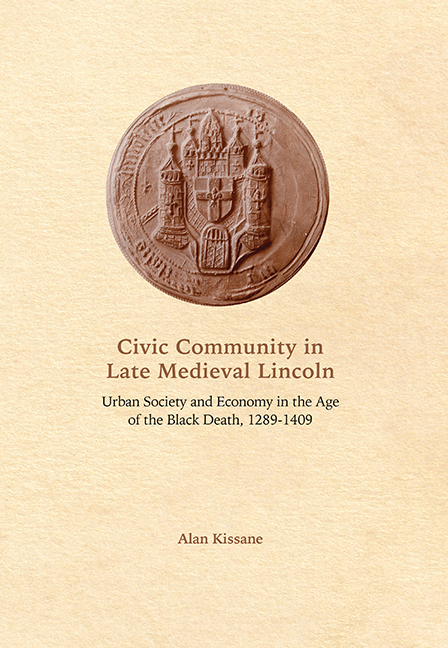 Civic Community in Late Medieval Lincoln
Civic Community in Late Medieval Lincoln Book contents
- Frontmatter
- Contents
- List of Illustrations
- Acknowledgements
- Abbreviations and Note on the Text
- Introduction
- 1 Urban Foundations: Occupational Structure
- 2 Lincoln as Entrepôt: Tolls, Trade and Credit
- 3 The Crown and the Fee Farm
- 4 The Growth of Civic Government
- 5 Fraternity, Orthodoxy and Communal Cooperation
- 6 Chantry Founders, Commemoration and the Rental Market
- Conclusion
- 1 Appendix 1: Occupational Sources and Data
- 2 Appendix 2: Lincoln Civic Officials, 1289-1409
- 3 Appendix 3: Lincoln Members of Parliament, c.1290-1410
- 4 Appendix 4: The Fraternal Year
- 5 Appendix 5: Perpetual Chantry Foundations
- Bibliography
- Index
1 - Appendix 1: Occupational Sources and Data
Published online by Cambridge University Press: 27 April 2017
- Frontmatter
- Contents
- List of Illustrations
- Acknowledgements
- Abbreviations and Note on the Text
- Introduction
- 1 Urban Foundations: Occupational Structure
- 2 Lincoln as Entrepôt: Tolls, Trade and Credit
- 3 The Crown and the Fee Farm
- 4 The Growth of Civic Government
- 5 Fraternity, Orthodoxy and Communal Cooperation
- 6 Chantry Founders, Commemoration and the Rental Market
- Conclusion
- 1 Appendix 1: Occupational Sources and Data
- 2 Appendix 2: Lincoln Civic Officials, 1289-1409
- 3 Appendix 3: Lincoln Members of Parliament, c.1290-1410
- 4 Appendix 4: The Fraternal Year
- 5 Appendix 5: Perpetual Chantry Foundations
- Bibliography
- Index
Summary
The following sources have been analysed to establish Lincoln's occupational profile according to the methodology set down in chapter one. Efforts have been made where possible to provide fair yet comprehensive coverage of each of the four periods reviewed (1289–1319, 1320–49, 1350–79, 1380–1409), though there is an element of bias towards the earlier period, with 952 individuals being noted before 1349 and only 715 after. One source which could have redressed this shortfall but which is not used here is the fragmented Poll Tax of 1377. The reason for its omission relates to the fact that it records the occupations of only a third of all taxpayers (77 of 305), all of whom are named as servants (famula). Whilst it is clear that this was a deliberate distinction on the part of the tax assessors, it is nevertheless too biased in favour of this particular group to be included here.
Manuscript Sources
Accounts of Robert le Venur and William Cause (covering the dates 1292/93, 1297/98); two civic registers, the Burwarmote Book (1308–76) and the Blickling Homilies (c.1291–1409); aulnage accounts (1398–1402); civic gaol delivery rolls (1352–55, 1365–68, 1398, 1403); civic deeds (1301, 1353); charters and accounts of the Dean and Chapter (1289–1399); coroners’ rolls (1333–97); the Welbeck Cartulary (1302–71); parliamentary accounts (1301, 1305, 1316); the accounts of Henry de Lacy, earl of Lincoln, for Lincoln castle (1296); the accounts of Hugh de Cressy, constable of Lincoln castle (c.1351); exchequer accounts (1301, 1305); records of the justices of the peace (1332–33, 1351–54, 1395–96); the lay subsidies of 1327, 1332 and 1340; certificates of the statute merchant/staple court (1290–1409); inquisition ad quod damnum certificates; and the records of the King's Bench (1331, 1333, 1367, 1374–77, 1395–96).
Printed Primary Sources20
Thurgaton Cartulary (1290–1305); patent, close, charter and fine rolls (1290– 1409);calendars of inquisitions miscellaneous and post-mortem (1290–1409); ancient deeds (1290–1409); sessions of the peace (1351–54, 1360–75, 1381–96); the 1341 royal inquest;the assize roll of 1298; charters of the Dean and Chapter (1290–1320); bishops’ registers and excerpts of wills (1289–1409); and the overseas accounts of Boston (1377–99).
- Type
- Chapter
- Information
- Civic Community in Late Medieval LincolnUrban Society and Economy in the Age of the Black Death, 1289-1409, pp. 239 - 245Publisher: Boydell & BrewerPrint publication year: 2017


